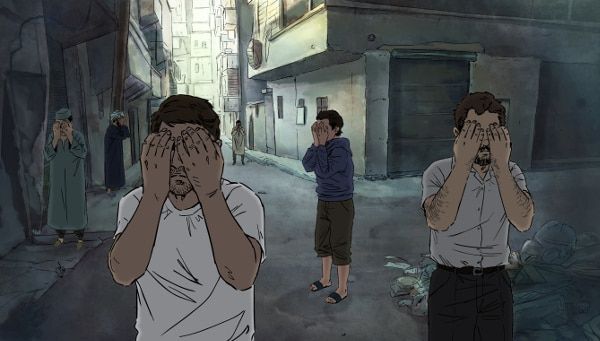Eye For Film >> Movies >> Zero Impunity (2019) Film Review
Zero Impunity
Reviewed by: Amber Wilkinson

This hybrid documentary by Nicolas Blies and Stéphane Hueber-Blies, alongside animation co-director Nicholas Lambert, is just one facet of their major transmedia project that aims to expose the proliferation of rape as a weapon, and by-product, of conflict around the world.
A second element of the project is giant art installation slide projections, which are captured on film here, everywhere from the US to a refugee camp in Jordan to France. As huge faces loom on buildings, we see passers-by just going about their business, or perhaps taking an idle photo before moving on - the same attitude, you might argue after seeing the film, that those on the outside have towards warzones happening a very long way from home.

Animation has become an excellent tool for documentarians in recent years, with films including Waltz With Bashir and Another Day Of Life using it to recreate events. Here, it is chiefly used to illustrate the testimony of those who have suffered sexual violence in war, thereby allowing a level of anonymity to be maintained. The filmmakers also stop short of showing the physical violence itself, letting a blank screen, the viewers' imaginations and the survivors' words do the talking. Also included, is opinion from investigative reporters and psychologists, alongside evidence from whistleblowers.
Western documentary regulars may feel as though they are in familiar territory at the start of the film, which begins by focusing on Syria - but soon the violence considered will come a lot closer to home. Through the recollections of a mother, we hear how her daughter Nora, then 11, was held hostage by the Bashar al-Assad regime and, ultimately, raped. Later, we'll hear how a woman in Ukraine found herself held captive and violated for days, with no subsequent recourse to the law, before the film moves on to consider the fact that rape is not only often an "invisible crime" and used as a weapon in conflict, but that the very nature of the instability and lack of law in these countries can give a "licence to rape". This "hear no evil, see no evil, speak no evil" idea is further underlined by slides, as part of the art installation, depicting people uncovering their faces or mouths.
While rape as a weapon may suffer from people turning a blind eye, few would dispute it happens somewhere - although as this film outlines, the impact of the resulting "shame" and ostracism is often overlooked (those interested in educating themselves about that might try to find a copy of 2007's Lumo). The film also details the way denial plays a huge role in allowing sexual violence to flourish, not just through the reluctance of those who have suffered to come forward, for obvious reasons, but because people are unwilling to believe that those on "their side" would ever do something so horrendous.
These arguments build to the second half of the film, when the spotlight settles on Abu Ghraib and the UN peacekeepers in the Democratic Republic of Congo. The US torture and abuse at the prison in Iraq has, like events in Syria, been well documented down the years (and I recommend Ghosts Of Abu Ghraib if you want to get up to date) but here the focus is on the sexualised nature of much of the violence, that saw inmates stripped and subjected to everything from sexual humiliation to rectal feeding.
It is here, that the filmmakers begin to consider the reluctance of authorities - such as the US government and, later, the UN - to address problems in their ranks. Abu Ghraib offers an example of sexual violence being somehow dismissed as being for "medical or security reasons". Meanwhile in the DRC, the claim outlined is that UN Peacekeepers drove what is known as "survival prostitution" - essentially, the populace being so hungry, for example, that selling themselves for "bottles of water and biscuits" becomes the only option.
This film is indisputably heavy - meaning that perhaps television or streaming will be a better berth for it, as it's certainly going to be a tough sell in terms of "a night out". It also becomes very dense in places - the filmmakers are trying to pack a lot in here and perhaps less on situations already heavily documented, such as Syria and Abu Ghraib, would have allowed them more time to focus on under-discussed topics, such as the alleged indifference of the UN (As one whistleblower puts it: "Our job at the UN was to basically not find any wrongdoing in the institution."). Better though, to take on too much than too little and there's no doubt that this film opens plenty of avenues for wider societal debate.
Reviewed on: 12 Jun 2019















